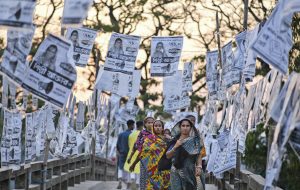In February 2023, Bangladesh’s Election Commission (EC) marked its first year in office. Since Bangladesh is less than 12 months away from holding its next general election, it is pertinent to assess the challenges the EC faces in organizing a national election that is acceptable to all political parties as free and fair.
Bangladesh’s 2014 and 2018 general elections were marred by controversy. The opposition boycotted the 2014 election, and most liberal democracies called for a re-election. The ruling Awami League (AL) argued that the election was necessary to avert a constitutional crisis. However, China and India, two powerful allies of Bangladesh’s current regime, did not object to the election.
Unlike the 2014 election, the opposition contested in the 2018 election, but the vote was allegedly widely rigged. The AL bagged over 96 percent of the total votes cast. There were multiple irregularities, including reports of AL members and police stuffing ballots for the ruling party and voter intimidation, and these were widespread. Transparency International found severe irregularities in 47 of the 50 constituencies it investigated.
However, the context for the upcoming election is more complicated than the previous ones. On December 10, 2021, Bangladesh’s influential development partner, the United States, levied sanctions on Bangladesh’s elite paramilitary force, the Rapid Action Battalion (RAB), and six of its officials, including current and former police chiefs, for serious human rights violations. Notably, the U.S. imposed sanctions on Bangladesh officials on the same day it levied sanctions on North Korean and Chinese officials. The United States also did not invite Bangladesh to its democracy summits.
In recent times, major liberal democracies and Bangladesh’s major development partners, including EU countries, the U.K., the U.S., and Japan, have publicly reiterated the need for Bangladesh to hold the next general election in a free and fair manner.
In mid-February 2023, State Department Counsellor Derek Chollet emphasized a free and fair election at a meeting with Prime Minister Sheikh Hasina. Chollet later flagged that further erosion of democracy in Bangladesh may limit U.S. cooperation with Bangladesh.
The opposition Bangladesh Nationalist Party (BNP) is organizing a series of countrywide protest rallies demanding an election under a neutral caretaker government. The AL has made it clear that they have no intention of meeting that demand, claiming that a caretaker government opens spaces for a military takeover. It is referring to the military-backed caretaker government that ruled the country for almost two years from 2006 to 2008.
Against this backdrop, the EC’s path towards organizing a free and fair election does not seem smooth. Notably, it faces three significant challenges ahead.
First, the current EC must demonstrate its independence from government influence. Hasina has publicly reiterated that the EC is independent. In its actions, the EC needs to demonstrate that.
In recent by-elections in six parliamentary constituencies, ruling party members were seen to take control of polling centers. The state apparatus was used to intimidate opposition candidates, and an opposition candidate was mysteriously disappeared before the election only to be “found” later. In all these cases, the EC could not demonstrate that it is a neutral organization that acts independently.
Secondly, the EC seems adamant about carrying out its procedural operations rather than addressing the ethical side of the procedural obligations. Currently, the EC is focusing on organizing an election but not doing much on making the next election free, fair, and inclusive. EC officials have said several times that it is not keen to hold dialogue with the opposition BNP as the BNP is pursuing an agenda of an election under a caretaker government. Such an approach will not help EC to boost its credibility.
Finally, the biggest challenge before the EC is to bring back voters’ confidence in the election process. The election used to be an event of celebration in Bangladesh where voters used to look forward to voting. Festivity around the election campaign and high voter turnout were signature election scenes when voters perceived elections as free and fair.
However, in recent times, Bangladeshi voters have seemingly lost interest in voting against widespread vote rigging and election result fixing. As a result, voter turnout was low in the recent by-elections. One center recorded only a 16 percent voter turnout, while the actual number may be much lower.
A similar scenario has emerged in the 2020 mayoral elections in the two biggest cities in Bangladesh – Dhaka, the capital, and the port city of Chattogram. Less than 30 percent of voters turned up to exercise their franchise.
Voter apathy will not only put the credibility of the EC in further jeopardy, but also such voting behavior will make it more challenging for the ruling AL to claim the legitimacy of the next election as free and fair. The EC should engage in a massive campaign to woo voters and go all out to bring the BNP and other opposition parties on board the next election. This is essential to avert an election crisis.

































